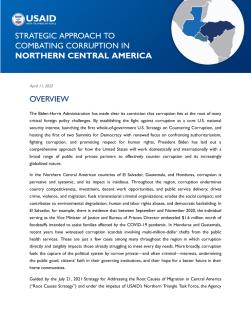The Biden-Harris Administration has made clear its conviction that corruption lies at the root of many critical foreign policy challenges. By establishing the fight against corruption as a core U.S. national security interest, launching the first whole-of-government U.S. Strategy on Countering Corruption, and hosting the first of two Summits for Democracy with renewed focus on confronting authoritarianism, fighting corruption, and promoting respect for human rights, President Biden has laid out a comprehensive approach for how the United States will work domestically and internationally with a broad range of public and private partners to effectively counter corruption and its increasingly globalized nature.
In the Northern Central American countries of El Salvador, Guatemala, and Honduras, corruption is pervasive and systemic, and its impact is insidious. Throughout the region, corruption undermines country competitiveness, investment, decent work opportunities, and public service delivery; drives crime, violence, and migration; fuels transnational criminal organizations; erodes the social compact; and contributes to environmental degradation, human and labor rights abuses, and democratic backsliding. In El Salvador, for example, there is evidence that between September and November 2020, the individual serving as the Vice Minister of Justice and Bureau of Prisons Director embezzled $1.6 million worth of foodstuffs intended to assist families affected by the COVID-19 pandemic. In Honduras and Guatemala, recent years have witnessed corruption scandals involving multi-million-dollar thefts from the public health services. These are just a few cases among many throughout the region in which corruption directly and tangibly impacts those already struggling to meet every day needs. More broadly, corruption fuels the capture of the political system by narrow private—and often criminal—interests, undermining the public good, citizens’ faith in their governing institutions, and their hope for a better future in their home communities.
Guided by the July 21, 2021 Strategy for Addressing the Root Causes of Migration in Central America (“Root Causes Strategy”) and under the impetus of USAID’s Northern Triangle Task Force, the Agency is helping to drive a coordinated and comprehensive interagency policy and programmatic response to corruption in the region. This means forward-leaning diplomacy, flexibility in the deployment of foreign assistance, selectivity in our partners, and responsiveness to opportunities and challenges as they arise.
It also means a commitment to governance based on the reality that transparent, accountable, and effective democratic governance is a critical precursor to all the objectives of the Root Causes Strategy. This commitment requires striking a balance between responsiveness to short-term challenges and opportunities and a long-term, systems-oriented approach to enhancing capacity across all sectors and actors and levels—regional, national and sub-national—to safely and sustainably prevent, detect, mitigate, and punish corruption.
This paper establishes the institutional framework and documents that guide USAID’s efforts to combat corruption in Northern Central America. It lays out USAID’s understanding of corruption and its impact in the region. Finally, it describes USAID’s programming and forward-looking strategic approach to optimize Agency resources—from funding and staff to dedicated partners at all levels—to achieve the Root Causes Strategy’s anti-corruption objectives and contribute to the Agency’s and U.S. government’s global goal of curbing corruption and its deleterious effect.

